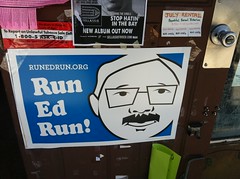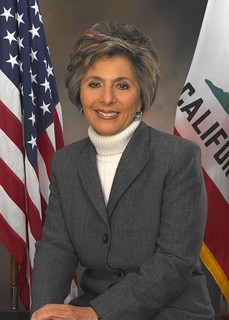 Despite an earlier commitment that he would not run for Mayor, Ed Lee looks set to launch a campaign
Despite an earlier commitment that he would not run for Mayor, Ed Lee looks set to launch a campaign
by Brian Leubitz
Ed Lee wasn’t ever really in the running to be interim Mayor of San Francisco after Gavin Newsom moved on (and up?) to Sacramento. He kind of appeared from nowhere. Lee was actually in Asia during the time of the selection, and seemed more concerned with keeping his position as City Administrator than becoming Mayor. And besides, he said he had no interest in running a political campaign. He had never been that kind of political creature. The Board of Supervisors had no choice but to take him at his word. They were getting a lot of pressure from all quarters to select Lee rather than Sheriff Mike Hennessey.
And at every opportunity since then, Lee has denied that he’s running for Mayor. But, as I am sitting here right now, there can be very little doubt that Lee will run for Mayor. And he’ll likely win.
To understand how Ed Lee became Mayor, you have to understand the political machine in San Francisco. Of course, we probably don’t have time to explain the entire scope of that machine, but I suppose the underlying statement would be to never underestimate Willie Brown. Despite the vision of the elder statesman and observer that he puts on in his “Willie’s World” column and his public appearances, Brown is still a shrewd participant in the political process. More than anybody else in the City, he knows how to make things happen.
Together with Chinatown power broker Rose Pak, Brown pushed the so-called moderate supervisors to block any progressive candidate for mayor, somebody like former Mayor Art Agnos. And while Sheriff Hennessey is very well respected throughout the City, he was never really part of the apparatus of state. Pak and Brown weren’t sure what to expect from him. On the other hand, not only did they know they had a capable administrator in Lee, they also knew that he was both affable and moderate. Somebody who through his personal connections could reach out to a number of communities in the City. And they knew they could get him re-elected in November.
All that is not to say that Lee was lying at the beginning of the year when he said he wasn’t going to run. I have complete faith that he believed it at the time. Political campaigns in San Francisco are bloodsport, and Ed Lee circa January very likely had no interest in going through that wringer. But time can change things, Brown knew as much. San Francisco is used to the bloody politics, but still hopes for something different. Lee is clearly competent, and has been able to build consensus. He hasn’t been rigid in ways that Gavin Newsom was, but still was able to build a budget that he could believe in. With this consensus, a feeling of harmony developed at City Hall and all of sudden Lee was getting comfortable in Room 200.
And then there is the “Run, Ed, Run” campaign. Run by a few powerful consultants, including David Ho, who had worked on several progressive campaigns in the past, but had been central to a growing rift in the progressive community, the campaign became omnipresent. You can now hardly walk down a street in the City without seeing the stylized drawing of Lee’s moustache. It now has quite the list of supporters, but it was hardly a grassroots movement. The campaign is an astroturf project that has now been there long enough that some grass has grown on top of it. To be sure, Lee has a good deal of supporters, and by all means they should encourage him to run. But an Ed Lee run for mayor will necessarily change the atmosphere in City Hall.
At this point, there can be few questions left as to whether Lee is considering a run, something he said that he was not doing a few weeks back. Months ago when the Run, Ed, Run signs began appearing, Lee could have stifled that conversation, but did not. He kept his options open, and now he is seriously considering it before the filing papers are due in mid-August. Lee has been rumored to making calls, and those rumors are now public:
Lee has been talking to all the people you would expect him to talk to over the past few days, my sources tell me, letting them know that he’s seriously considering it and looking for support. It’s a little late to be lining up big endorsements; a lot of people have already signed on with one of the other candidates. But he’ll be happy with co-endorsements and second-place endorsements — and given his connections, he’ll be able to raise substantial amounts of money quickly. (SF Bay Guardian
There are certainly reasons for Lee to consider running. As Tim Redmond points out, many people, especially moderates and those close to Lee, are saying that the strongest candidates now are Lee and SF Sen. Leland Yee. And a Yee mayorship is something that would be unacceptable to many in the City. Redmond, the Bay Guardian’s executive editor, is also right that Lee won’t garner many first choice endorsements having entered so late, but he’ll have the name ID, money, and just enough on the endorsement front to be competitive.
And today, Sen. Feinstein weighed in:
Sen. Dianne Feinstein is calling on Mayor Ed Lee to run for a full four-year term, saying she believes “San Francisco needs his steady leadership and unifying presence in City Hall.”
In a statement released to us late Tuesday, Feinstein said that despite Lee’s earlier pledge not to run, “his responsibility is to the people of San Francisco, and the voters alone should determine whether this talented public servant should continue on the job.”
Feinstein cited the former city administrator’s success with both the budget and pension reform, and her own “unusual circumstances” in becoming mayor after the 1978 assassination of Mayor George Moscone.(SF Chronicle)
Feinstein has spoken to Lee about this privately over the past few months as well. The Chronicle has been quietly rooting along in its news section, though editorializing against a run. And Pak makes no bones about her intentions:
“When this is all done, I’m going to send a box of chocolates to Chronicle Editorial Editor John Diaz,” said Lee booster Rose Pak, referring to an editorial a week ago Sunday urging Lee not to run.(SF Chronicle)
Lee is a good Mayor, and there are far more objectionable candidates, both credible and not so credible than him. Yet, as the Chronicle editorial points out, a campaign would drastically change the atmosphere in City Hall. This is, after all, San Francisco politics. Nothing is easy.
Lee has stated his intention not to run, but he still has time before the deadline. If he intends to go back on previous statements, he should do so as soon as possible to let the City honestly evaluate all candidates. I suppose it may just be time to resume the blood sport.
Once more unto the breach, dear friends, once more;
Or close the wall up with our English dead.
In peace there’s nothing so becomes a man
As modest stillness and humility;
But when the blast of war blows in our ears,
Then imitate the action of the tiger. . . .
–Shakespeare, Henry the Fifth


